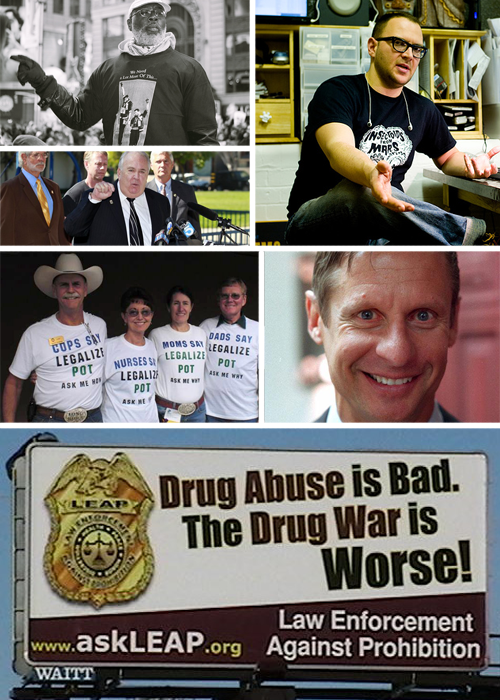Our world is constantly unsettled. There are few places that aren’t ravaged by crime, terror, and unrest, and America is no different. The American drug war began in 1969, when then-President Richard Nixon declared drug abuse to be a “serious national threat.” It’s true that drug abuse is awful and should be taken seriously, but the drug war has needlessly ruined or claimed the lives of a startling number of citizens and wasted billions of tax dollars. Furthermore, it has allowed drugs to flow through an unregulated market operated by dangerous, greedy people, putting users at an undue added risk to their lives. Today, many people are fighting to end the drug war — and their ranks include some former police officers. The following lists compiles some of today’s biggest advocates against the drug war, as well as the fight against police harassment, profiling, and brutality.
Ethan Nadelmann
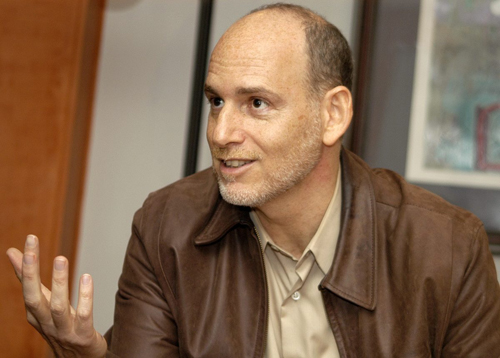
Ethan Nadelmann, a seasoned academic and writer, is best known as the founder and executive director of the Drug Policy Alliance, one of the leading organizations in the United States for drug policy reform. His organization operates offices in five states, as well as one for national affairs in Washington, D.C. In 2000, the Drug Policy Alliance spearheaded California’s Proposition 36, which allows defendants convicted of non-violent drug offenses to receive a probationary sentence over jail time. It has also founded a plethora of needle exchange and syringe access programs, which prevent the spread of HIV and other blood-borne diseases among drug users. Under Nadelmann’s leadership, the DPA has become one of the most effective organizations for inspiring positive change in drug reform in the United States.
George Soros
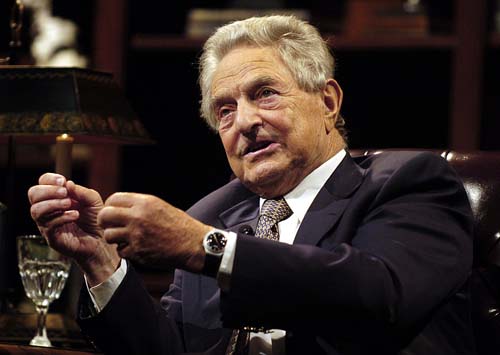
The Drug Policy Alliancewas created via the merging of a number of smaller institutions, among them Nadelmann’s Lindesmith Center. The Lindesmith Center was created using funds provided by famed Hungarian-born philanthropist George Soros. Soros, whose net worth is currently more than 14 billion dollars, has a long history of backing progressive causes. He is chairman of the Open Societies Institute, which was founded to promote social, economic, and legal reform, as well as to protect human rights. Soros’s involvement with the Drug Policy Alliance is ongoing; he currently serves on the DPA’s board of directors.
Norm Stamper

This former Chief of the Seattle Police Department first entered the national consciousness during the World Trade Organization’s Ministerial Conference in 1999, when he authorized the use of tear gas to break up protests against the meeting. These events led to his resignation (he was quoted as saying, “I made a major mistake”), and he has spent much of his time since working to expose the difficulties of policing, as well as advocating for drug reform. As a writer for progressive online news source The Huffington Post, Stamper has blogged about Marijuana legalization, domestic abuse, racism, homophobia, and the drug war (check out this enlightening article about police involvement in the political struggle for drug reform: Cops For and Against the Drug War). He recently published a book titled Breaking Rank, about “the dark side of American policing.”
Neill Franklin
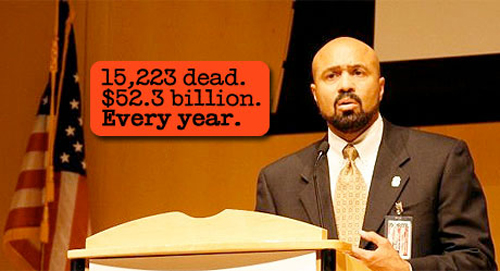
One group making fantastic strides in the fight against the drug war is LEAP: Law Enforcement Against Prohibition. Neill Franklin, the organization’s executive director, is a 34-year veteran of the Maryland State Police and Baltimore Police Department. After years of arresting all sorts of people involved in the drug trade—some relatively innocent, some incredibly guilty—Franklin was convinced by former Baltimore Mayor Kurt Schmoke that the drug war was instigating more violence than it was preventing. Aside from his work with LEAP, Franklin is involved with a number of community and religious councils.
Howard Wooldridge

Howard Wooldridge led an 18-year career as a police officer and detective in Bath Township Michigan before his turn at drug reform advocacy. In 2002, he co-founded LEAP. In 2003, he rode a horse named Misty 6,400 miles on saddleback from California to New York in order to encourage citizens to oppose drug prohibition. He served for four years as LEAP’s envoy to Washington, D.C., and now he works with COPs: Citizens Opposing Prohibition. He’s also the producer of the nifty t-shirts featured above.
Stephen Downing
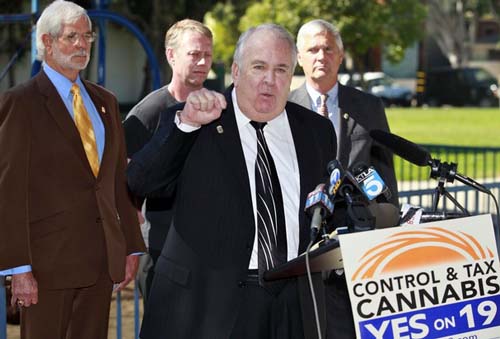
Stephen Downingwas a Police Commander when Richard Nixon announced the War on Drugs. Following that, he was the Bureau Chief of the Los Angeles Police Department’s Narcotics Operation. In 2010, after his retirement, Downing spoke out in support of California’s Proposition 19, which would legalize the production, distribution, and consumption of Marijuana in the state. Downing claims that he changed his mind about policies regarding the drug when one of his undercover police officers were killed during an operation—he observed the senseless violence that prohibition of the drug inspired, and that outlawing marijuana put its distribution into the hands of street gangs. He now works as a representative for LEAP.
Joseph D. McNamara
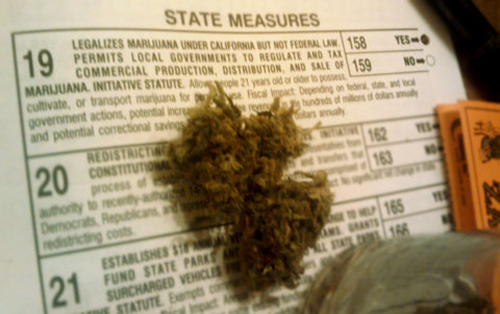
Joseph McNamarabegan his career in law enforcement as a beat cop in Harlem. In 1973, he became the Police Chief of Kansas City, Missouri, and three years later was appointed chief of San Jose, California, a position he held until his retirement in 1991. He’s a seasoned police veteran, a Harvard graduate, and a research fellow at the Hoover Institution; he is an expert on drug reform. In a panel discussion led by the National Review, McNamara pointed out that $500 worth of heroin could bring in as much $100,000 on the streets, which is why violent offenders are drawn to the drug trade. The reason behind this inflation? Drug prohibition. If the drugs aren’t so hard to obtain, they won’t produce as much revenue for those willing to sell them.
Leigh Maddox
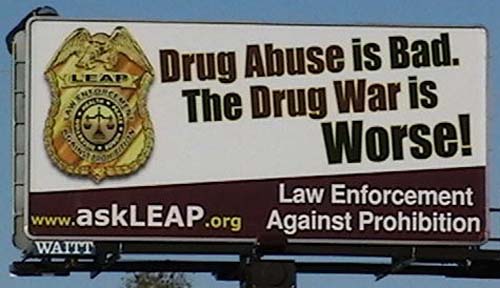
This former Maryland StatePolice Captain changed her attitude about the War on Drugs when a good friend of hers, an undercover police officer in Washington, D.C., was shot in the head during a sting. Now she advocates against violence, and is attempting to steer drug policy away from criminal prosecution and towards substance abuse treatment. Maddox now serves on the board for LEAP and currently lectures about escalating violence associated with global drug cartels.
Walter Cronkite
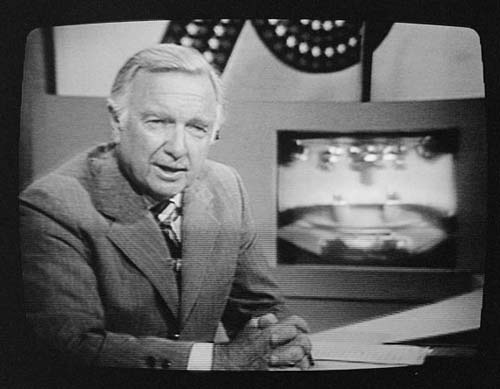
Walter Cronkiteis renowned worldwide for his two-decade run as the anchor for the CBS Evening News. In the years following his retirement, he became involved in political activism, working for causes including hunger, religious tolerance, personal liberty, and, yes, drug reform. In a fundraising letter he penned on behalf of the Drug Policy Alliance before his death in 2009, he made his position clear: “The war on drugs is a failure.”
Gary Johnson
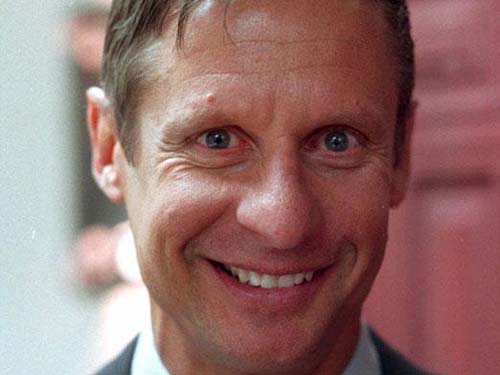
In 1998, Republican then-Governor of New MexicoGary Johnson was campaigning reelection. His platform? The decriminalization of Marijuana. He won by a 10% margin. Johnson considered the War of Drugs to be a waste of money, and believed that drug addiction should be considered a health issue and not a criminal one, and pointed out that nearly half of the money spent on police, courts, and prisons were used to prosecute drug offenders. Johnson is currently bidding for a Republican nomination for the 2012 presidential election, and one of his central concerns is drug policy reform.
Carl Dix

There is a flipside to all of this police involvement. We grant a great deal of power to our authority figures, and sometimes, when that power goes unchecked, it gets abused. Police brutality is startlingly common, and it has become necessary for certain organizations and individuals to prevent it from happening again. Carl Dix is one of those individuals. As the national spokesperson for America’s Revolutionary Communist Party, Dix advocates for revolution as a means to end injustice. He has appeared on CNN, C-SPAN, and been published in the Los Angeles Times, Boston Globe, and New York Times Magazine discussing identity politics and human rights. In the 1984 and 1988 presidential elections, Dix ran as the Revolutionary Communist Party’s “anti-candidate.”
De Lacy Davis
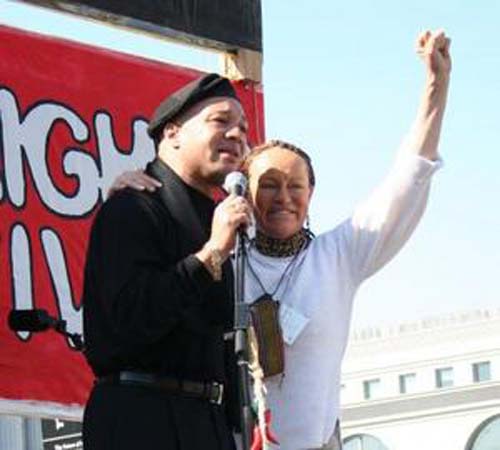
As the leader of Black Cops Against Police Brutality, Brother Sergeant De Lacy Davisspends his time advocating for the rights of people who were treated unfairly—and sometimes killed—by law enforcement officers such as himself. Davis began his career in 1986 with the police department in East Orange, New Jersey. He spent four years as the president of the Northeast chapter of the National Black Police Association, and was promoted to sergeant in 1998. De Lacy acts as a representative from his trade, traveling as far as Ghana and Rome to promote the rights of individual citizens. He has appeared on numerous television programs, from MTV News to Ricki Lake to Oprah, and continues to devote his time to the cause against violence.
Copwatch
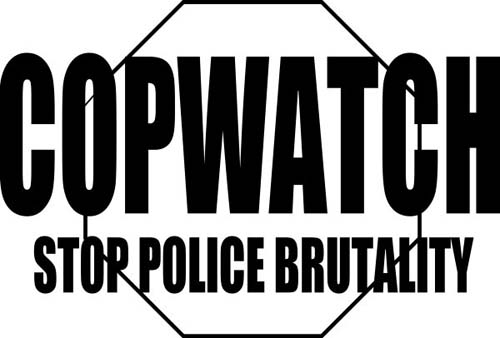
Copwatch is a collection of activist organizations committed to observing and documenting police activity. They maintain a searchable online database (available here: http://www.copwatch.org/) which allows the general public to file or search complaints regarding police misconduct. Copwatch was founded in 1990 in Berkeley, California, when a group of activists decided to document police activity during a series of attacks on the homeless at People’s Park in the city’s Telegraph Avenue neighborhood. Now Copwatch organizations exist in cities all over the country—and anyone can get involved.
The Black Panther Party
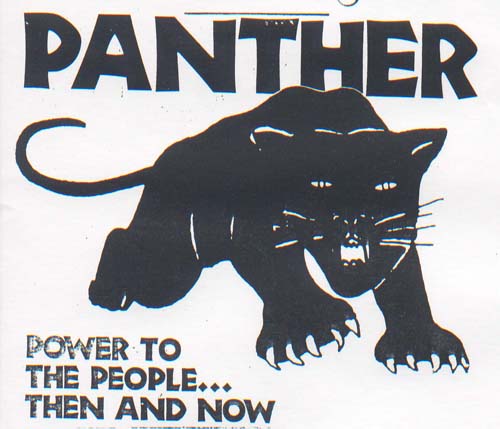
It was the position of the legendary Black Panther Partyof the 1960s and 70s that police departments were institutionalizing abuse towards minorities. In 1966, when the party formed in Oakland, California, it organized a number of neighborhood patrols, which were sent to observe and document police activity. Black Panthers would often follow officers on their beats, which sometimes ended in bloody confrontations. These methods, which have since been refined by groups like Copwatch, laid the ground for modern police brutality advocacy.
Cory Doctorow
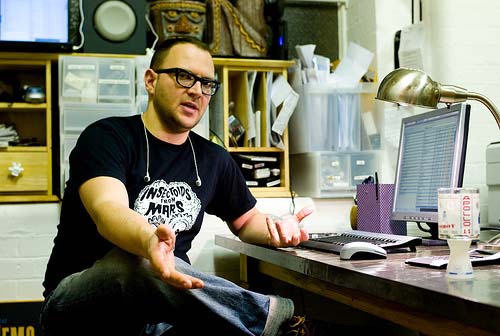
Many people would recognize Cory Doctorow as a nerdy Internet maven, blogger, science-fiction writer, and a co-editor of the popular website Boing-Boing, but he’s also an advocate for a concept he refers to as “reverse surveillance.” Doctorow considers certain “Big Brother”-style modern police states (Like London, which recently placed closed circuit television cameras on nearly every one of its blocks) to be gathering too much information. The amount of data that compile about their citizens is so gargantuan that it becomes entirely unusable. In this opinion piece he wrote for the London Guardian, he explains how gathering data on innocent citizens makes crime detection impossible, referring to criminal incidents as “needles buried in a haystack of irrelevancies.”
